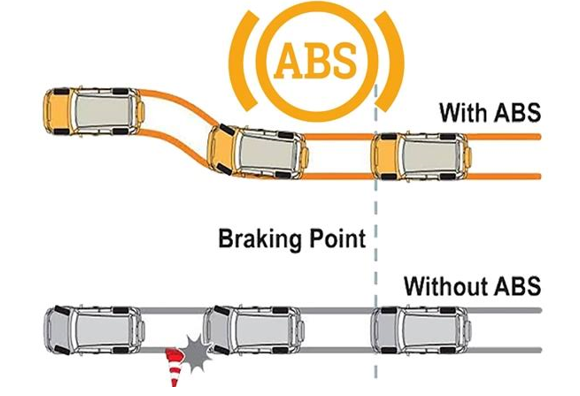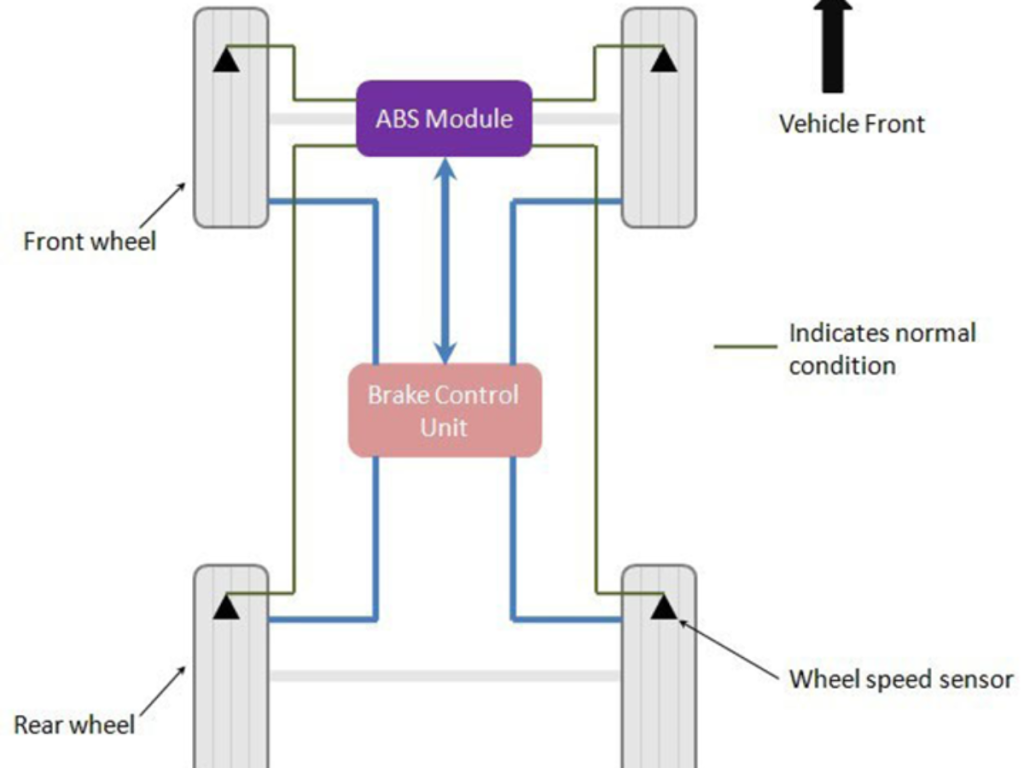A safety device known as the anti-lock braking system (ABS) prevents a vehicle’s wheels from locking up when it is braking. As a result, even while braking suddenly, the driver can keep the car within control. The brakes are rapidly pumped on and off several times per second to activate ABS. By doing this, the wheels are kept from locking up and sliding, which could end up in the car losing control.
In slick circumstances, such as on wet or snowy roads, ABS is very helpful. The car may skid out of control if the wheels lock up on slippery pavement. This may be avoided with the use of ABS by keeping the wheels from locking up. It makes it possible for the driver to guide the car around obstructions to avoid accidents.
Important Point About ABS

Here are some important points about ABS:
- ABS is a passive safety feature. This means that it does not require any input from the driver to work.
- ABS is not a substitute for good driving habits. Drivers should still practice safe driving techniques, such as leaving plenty of space between vehicles and avoiding distractions while driving.
- ABS can only prevent wheel lockup. It cannot prevent accidents from happening. Drivers should still be aware of their surroundings and take steps to avoid accidents, even if their car has ABS.
- ABS can be noisy. This is because it is rapidly pumping the brakes on and off. Drivers should not be alarmed by this noise. It is a normal part of how ABS works.
- ABS can reduce stopping distances, but it will not make a car stop instantly. Drivers should still brake firmly and steadily when necessary.
What is the advantage of an anti-lock braking system
Here are some of the advantages of ABS:
- Prevents wheel lockup: ABS keeps the wheels from locking up during braking, which can aid in keeping the car under control.
- Reduces stopping distances: ABS can help to reduce stopping distances, especially on slippery roads.
- Improves stability: When braking, ABS can improve a vehicle’s stability, which can assist avoid accidents.
- Increases driver confidence: ABS can help to increase driver confidence, especially in slippery conditions.

History of ABS
Other businesses began developing ABS systems in the 1960s. Among them were Bosch, Lucas, and Bendix. The first commercial ABS system for passenger automobiles was launched by Bosch in 1967. The “Bosch 8.3 ABS” was the name of the system that was fitted in the Mercedes-Benz W116 S-Class. The 1970s and 1980s saw a rise in the use of ABS systems. The US government decreed in 1978 that all new vehicles sold in the country must feature ABS. This requirement makes ABS systems more accessible and more reasonably priced.
Disadvantages of ABS

- ABS can be noisy. When ABS activates, it can make a loud noise as the brakes are rapidly pumped on and off. This noise can be startling to drivers and passengers, and it can also be heard by pedestrians and cyclists.
- ABS can increase stopping distances. In some cases, ABS can increase stopping distances, especially on dry roads. This is because ABS prevents the wheels from locking up, which can actually increase friction between the tires and the road.
- ABS can be expensive. ABS is a relatively expensive safety feature, and it is not available on all cars. This can make it difficult for some drivers to afford ABS, especially if they are buying a used car.
- ABS can be unreliable. ABS systems can fail, and they can also be damaged by road debris or other factors. If ABS fails, it can reduce the effectiveness of the brakes and increase the risk of an accident.
- ABS can be difficult to use. Drivers who are not used to ABS may find it difficult to control the car when ABS activates. This can lead to accidents, especially in slippery conditions.
Conclusion
FAQs
Related posts:
- AMC Full Form: Benefits, Components, Needs, Advantage
- ORS Full Form: Dehydration, Myths, Flavors, Varieties & Facts
- PCC Full Form: Importance, Types, Application Process
- PAN Full Form: Legal Provisions, Regulations,
- BRB Full Form: Productive, Routine, Distractions
- MCD Full From: Introduction, Responsibility, Challenges
- CT Scan Full Form: Scans, price, Advantages
- USA Full Form: History, Economics,Technology, culture
Most Popular Links
Career Tests

Graduates & Post Graduates

21st Century Skills & Learning Test Grade 12

21st Century Skills & Learning Test Grade 11

21st Century Skills & Learning Test Grade 10

PSYCHOMETRIC IDEAL CAREER TEST™

PSYCHOMETRIC SKILL BASED TEST FOR 9TH

PSYCHOMETRIC ENGINEERING SELECTOR

PSYCHOMETRIC EDUCATOR PROFESSIONAL SKILLS

PSYCHOMETRIC STREAM SELECTOR™

PSYCHOMETRIC COMMERCE CAREER SELECTOR

PSYCHOMETRIC HUMANITIES CAREER SELECTOR









